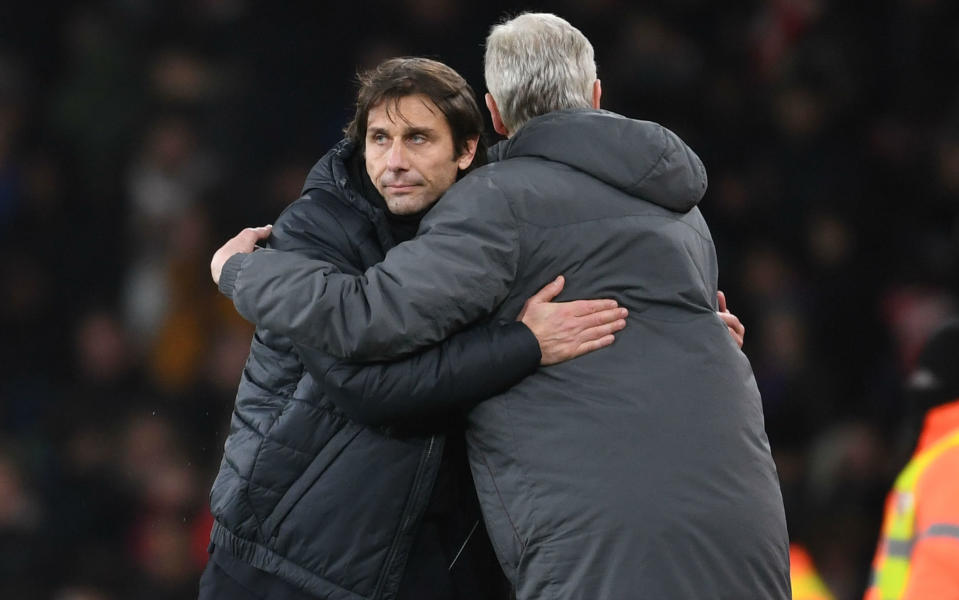The Premier League runs on disposable managers as fuel
Two managers threw a fit on Wednesday after their teams had played to a scintillating 2-2 tie.
Chelsea’s Antonio Conte, who has an awesomely talented and deep team in his care, complained that no real money is being spent on his team. Arsenal’s Arsene Wenger, meanwhile, had a whine about a completely legitimate penalty that went against his team, calling it “farcical.” Because it’s his habit to dig up any excuse he can find to deflect from bad results. Just as it’s Conte’s to always reduce every problem to a perceived lack of transfer spending — like Wednesday, when he said both Chelsea and his prior club Juventus were running an “austerity program.”
Which is weird, by the way, because last summer, Chelsea had a net expenditure of $112 million on transfer fees. The prior summer, the first of Conte’s tenure in West London, it spent about $113 million, when you deduct sales from purchases. During his three seasons with Juventus, meanwhile, the club broke even once and spent $88 million and $13 million the other two years — again, that’s net.
Which is to say that relative to their stature, Conte’s clubs have either spent lavishly or more carefully, but were never paupers in the player market. Just as there’s no grand conspiracy against Arsenal, no matter how hard Wenger tries to deflect blame onto anything or anyone but himself.

The unifying truth between these two managers is that neither seems to be long for his current club. And both were understandably cranky about a point that helped neither team, when both could well have won it.
Wenger is the second-longest tenured Premier League manager of all time, in charge of the Gunners since Oct. 1 1996. But it came as a stunner that his contract was renewed last season, the first time in eons Arsenal had failed to qualify for the Champions League. His deal runs through next season, but now that the Gunners have sagged to sixth place and sit a full 23 points out of first place and five out of the Champions League spots, even that might be optimistic.
Conte, meanwhile, is the sort of manager who trades on his intensity, and his relationship with the Chelsea brass — that is to say, owner Roman Abramovich and his right-hand woman Marina Granovskaia — seems to already be broken beyond repair. There was talk that he might leave before this season, in spite of cruising to the Premier League title in his first campaign with the club. And it’s pretty much a given that he’ll be gone this summer.
[ Follow FC Yahoo on Twitter and Facebook ]
They are not outliers. This is simply the transience of the Premier League manager’s existence. Win or die. Or, as the case might be, win and die. Jose Mourinho was out at Chelsea midway through the season following his title win. So was Claudio Ranieri. And he’d only gone and done it with Leicester City. On Jan. 9 of last year, he was named the Best FIFA Men’s Coach as the top manager in the global game for 2016. On Feb. 23, he was fired because Leicester had inevitably regressed back to its relegation-fighting mean.
So far this season, six managers have lost their jobs — including, naturally, Ranieri’s successor Craig Shakespeare. Last season, Bob Bradley, the American who had clawed his way to a chance in the world’s most famous soccer circuit, was fired within two months having never even gotten a transfer window to recruit some of his own players. This year, Frank de Boer was canned by Crystal Palace on Sept. 11, after a mere four league games — all of them lost.
Next up seems to be Mark Hughes. Other than Wenger, he’s the longest-tenured manager in the league who wasn’t promoted into the top tier with his current team — like Bournemouth’s Eddie Howe and Burnley’s Sean Dyche. Hughes took over Stoke for the 2013-14 season and has objectively done a fantastic job there, turning one of the world’s most dour teams into a consistent and stylish side.
In Hughes’s time at the club, Stoke has placed ninth, ninth, ninth and 13th. But now the Potters linger in 18th place and the relegation zone, and so his firing seems imminent. Never mind that the table is packed so tightly in the bottom half that a single win could lift Stoke to 13th place and that just two victories separate it from the top half of the standings. There are 16 games left to play.
Five current managers are within their first three months at their clubs. A dozen of them have not yet reached the two-year mark. Chances are a majority of them won’t. Somebody else will cycle in, and the game will churn on, fueled by disposable managers. A new manager will offer a brief placebo cure, and maybe a rescue from a ruinous relegation. And then the magic will wear off and it’ll be time for someone new again.
Whenever Wenger and Hughes wind up going, the longest-tenured Premier League manager to have only worked in the top tier with his current club will be Mauricio Pochettino, who is just 3 1/2 seasons into his time with Tottenham Hotspur.
Sometimes, it’s little wonder that managers are so irritable.
Leander Schaerlaeckens is a Yahoo Sports soccer columnist and a sports communication lecturer at Marist College. Follow him on Twitter @LeanderAlphabet.



